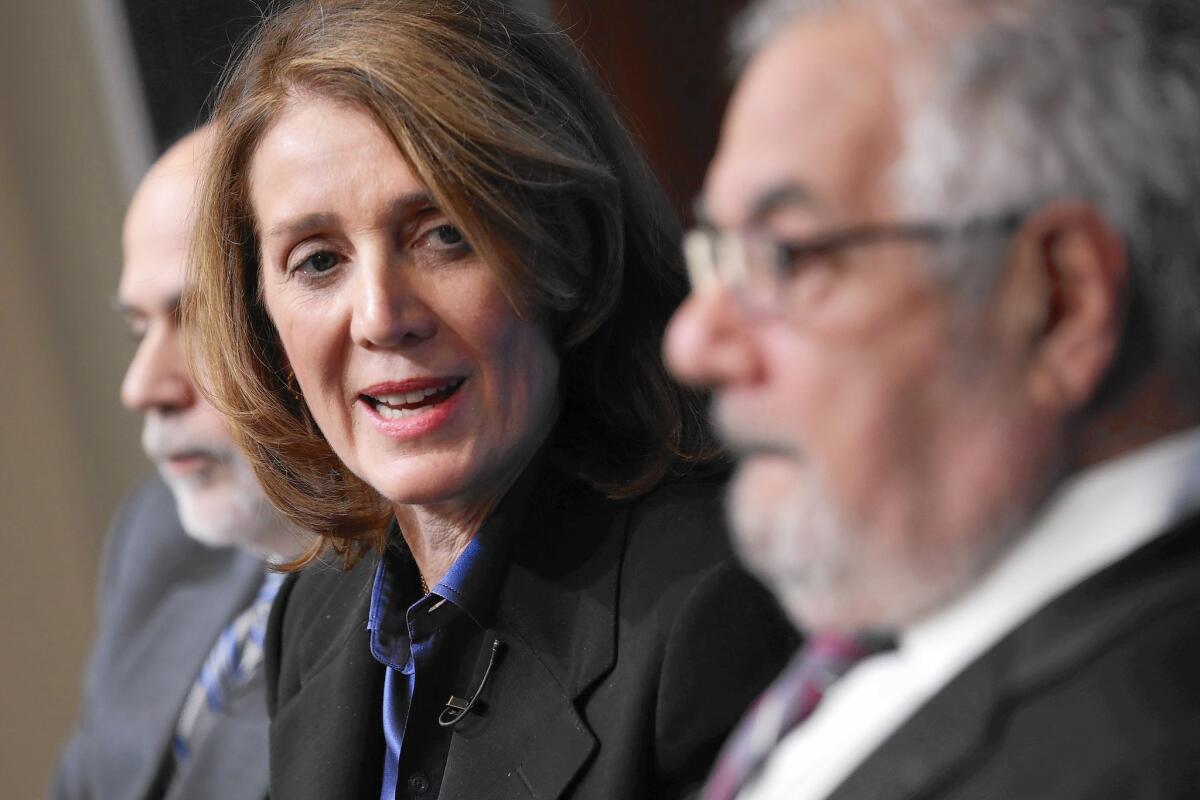Morgan Stanley CFO Ruth Porat to be Google’s new CFO

The balance of power between Wall Street and Silicon Valley shifted another degree westward.
Ruth Porat, chief financial officer of Morgan Stanley, is leaving to take the same job at Google Inc., a symbolically significant move by a high-profile Wall Street executive — and one of the financial industry’s most prominent women.
Porat’s move after 28 years at the white-shoe banking firm surprised both the high-tech and the high-finance worlds, and observers said it signaled deeper shifts between the two sectors.
“It’ll definitely turn some heads,” said David Arnold, president of Arnold Partners, a Los Gatos, Calif., executive search firm. He said he placed three Wall Street CFOs in the same roles at tech companies just last year. “There’s something going on.”
Porat will start her new job May 26, reporting to Google’s chief executive and co-founder, Larry Page.
“We’re tremendously fortunate to have found such a creative, experienced and operationally strong executive,” Page said.
The announcement of her new post comes as Silicon Valley struggles with accusations that it hasn’t done enough to hire and promote women in the industry. It also comes as a major sex discrimination trial heads to the jury this week in a case against tech’s top venture capital firm, Kleiner, Perkins, Caufield and Byers.
In one sense, Porat’s shift from a New York investment bank to the search giant is one more sign of Google’s rise to prominence over the American economic scene. Google, after all, is five times larger than Morgan Stanley in terms of market capitalization and more profitable by a range of measures.
But the high-level move also marks broader shifts in the economy as technology rises and finance still struggles with a post-financial-crisis hangover — roundly reviled by many for its role in bringing on the Great Recession and dogged by heightened scrutiny from a battery of regulators.
In addition, a shift in top talent to tech from finance, economists have said, generally would be more healthy for the economy, especially in pushing the manufacturing field. Studies have shown that growth of the financial sector over a certain level is a drag on the economy, particularly in developed countries.
Porat follows some other major Wall Street defections. Anthony Noto, for instance, moved to Twitter Inc. last year as its chief financial officer after leading its 2013 initial public offering as a managing director at investment banking firm Goldman Sachs.
“If you’re a CFO of a major bank, you are spending a good deal of your time dealing with compliance and regulatory issues,” said John Lonski, chief capital markets economist at Moody’s Analytics. “And you’re doing that a lot less if you’re at a dynamic and growing tech company. That’s a big difference between the two.”
Securities industry employment is down almost 11% in New York City from the pre-crisis year of 2007, when it hit 188,300 jobs, according to a recent report by New York state Comptroller Thomas P. DiNapoli.
Wall Street employment eked out a small gain of 2,300 jobs in 2014, the report said, but mostly not in glamorous and lucrative areas such as trading, which has been dramatically cut back in the wake of new restrictions from the 2010 Dodd-Frank financial reform law.
“All the jobs created in banking since the financial crisis have basically been in compliance and investment banking,” Lonski said. “It’s a different business now.”
Opinion polls, meanwhile, show overwhelming support for even tighter reins on Wall Street. A survey last year for the reform group Better Markets Inc. found that 62% of the public agreed that the “stock market is rigged” against them, and 60% across both parties favored stricter regulations.
The tech industry continues to roll up affirmations of its rising power. This month Apple Inc. joined as one of the 30 stocks of the venerable Dow Jones industrial average. And the technology-oriented Nasdaq composite index cruised past the 5,000-point threshold for the first time in 15 years.
“It’s not a bubble,” said Sam Stovall, senior equity strategist for Standard & Poor’s Capital IQ. In terms of stock market power, the tech sector has far outstripped finance, rising 88.5% versus 55% in the five years ended March 31, Stovall said. The broader Standard & Poor’s 500 index rose 80.3% in the period.
Tech’s increased wealth and cachet are being noticed on campuses. The percentage of Harvard Business School graduates taking jobs in finance fell to 33% last year from 42% in 2006, according to statistics released by the school. Though that number is still high, the percentage moving to the tech industry rose to 17% from 7%.
Employment in some tech sectors has soared. The number of jobs in the category of “Internet publishing and broadcasting and Web search portals” has jumped 157% to an estimated 175,000 this year from 68,500 in 2006, according to the U.S. Bureau of Labor Statistics.
Arnold, the executive search specialist, said the shift is driven by more than money.
“There’s excitement about what’s going on in technology,” he said. “Some of these companies are just fundamentally changing the way we live and do business. I think people are trying to change the world.”
Certainly, Wall Street is still plenty big.
The financial sector accounted for 7.2% of the nation’s economic output last year, according to the Bureau for Economic Analysis, only slightly down from 7.6% before the crisis in 2006. And Wall Street is still lucrative. The industry paid an average bonus of $173,000 last year, according to the New York State comptroller’s office, up 2% from a year earlier.
Morgan Stanley, for its part, put the best face on the move. Chairman James P. Gorman praised Porat as a “terrific partner and friend” and said in an email to employees obtained by the Los Angeles Times that she played a key role in leading the firm through the financial crisis of 2008.
“Healthy change maintains the vitality of an organization and energizes and engages individual leaders at every level of the firm,” Gorman wrote. Porat would be succeeded by Jonathan Pruzan, now co-head of the global financial institutions group in the firm’s investment banking unit, Gorman said.
And to be sure, Porat has plenty of personal ties to the tech industry and the area.
A native of Palo Alto, she is a Stanford University graduate and vice chairwoman of Stanford’s board of trustees. At Morgan Stanley since 1987, she was lead banker on several important technology financing rounds, including for Amazon.com Inc., EBay Inc., Netscape and Priceline Group Inc., Google said.
She also has had broader responsibilities. During and after the financial crisis, she led Morgan Stanley teams advising the U.S. Treasury on the troubled housing finance companies Fannie Mae and Freddie Mac and the New York Federal Reserve Bank on imperiled insurer American International Group Inc.
“I’m delighted to be returning to my California roots and joining Google,” Porat said.







